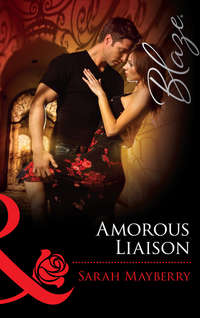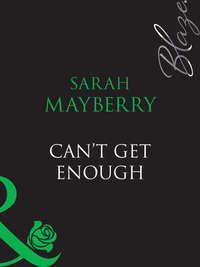
Полная версия
Her Secret Fling

About the Author
SARAH MAYBERRY is an Australian by birth and a Gypsy by career. At present she’s living in Auckland, New Zealand, but that’s set to change soon. Next stop, who knows? She loves a good department-store sale, French champagne, shoes and a racy romance novel. And chocolate, naturally.
Dear Reader,
What happens when a one-night stand becomes more than it should be? That’s the question that was the seed for Her Secret Fling. Two consenting adults have a good time and agree that’s all it was—then life intervenes and forces them to get to know each other. And, surprise surprise, they like what they discover—after some twists and turns along the way, naturally.
There’s a scene towards the beginning of the book that was in my mind from the moment I started imagining this story. I call it “man versus machine,” and if you’re reading this after finishing the book, you’ll know what I’m talking about. If you’re reading this letter first… well, you’ll know what I’m talking about pretty soon! I hope it tickles your funny bone as much as it did mine.
Most of all, I hope you enjoy reading about Jake and Poppy’s story as they work their way around to realising they need each other and that loving someone is a gift, not a burden. I love to hear from readers, so please drop me a line at sarah@sarahmayberry.com if you feel the urge.
Until next time,
Sarah Mayberry
Her Secret Fling
Sarah Mayberry

This one is for all my female friends—the passers of
tissues, the sharers of chocolate, the givers of hugs.
Having a laugh with my mates is one of the small,
perfect pleasures in life.
And, as always, no words would be written if it was
not for Chris cheering me on from the sidelines and
Wanda coaching me from the finish line. You both
rock—thank you for your endless patience.
Table of Contents
Cover
About the Author
Title Page
Dedication
Chapter One
Chapter Two
Chapter Three
Chapter Four
Chapter Five
Chapter Six
Chapter Seven
Chapter Eight
Chapter Nine
Chapter Ten
Chapter Eleven
Copyright
1
WHATEVER YOU DO, don’t throw up.
Poppy Birmingham pressed a hand to her stomach. The truth was, if her breakfast was destined to make a reappearance, that hand was hardly going to make a difference. She let her arm drop. She took a deep breath, then another.
A couple of people frowned at her as they pushed through the double doors leading into the Melbourne Herald’s busy newsroom. She was acutely aware that they probably recognized her and were, no doubt, wondering what one of Australia’s favorite sporting daughters was doing hovering outside a newspaper office, looking as though she was going to either wet her pants or hurl.
Time to go, Birmingham, the coach in her head said. You signed up for this. Too late to back out now.
She squared her shoulders and sucked in one last, deep breath. Then she pushed through the double doors. Immediately she was surrounded by noise and low-level excitement. Phones rang, people tapped away at keyboards or talked into phones or across partitions. Printers whirred and photocopiers flashed. In the background, huge windows showcased the city of Melbourne, shiny and new in the morning sunshine after being washed clean by rain overnight.
A few heads raised as she walked the main aisle, following the directions she’d been given for the sports department. She tried to look as though she belonged, as though she’d been mixing it up with journalists all her life. As though the new pants suit she was wearing didn’t feel alien when she was used to Lycra, and the smell of stale air and coffee and hot plastic wasn’t strange after years of chlorine and sweat.
The rows of desks seemed to stretch on and on but finally she spotted Leonard Jenkins’s bald head bent over a keyboard in a coveted corner office. As editor of the sports section on Melbourne’s highest circulating daily newspaper, Leonard was the guy who assigned stories and had final say on edits and headlines. He was also the man who’d approached her six weeks ago and offered her a job as a columnist.
At the time she’d been thrown by the offer. Since she’d been forced into retirement by a shoulder injury four months ago she’d been approached to coach other swimmers, to work with women’s groups, to sponsor a charity. A chain of gyms wanted her to be their spokesperson, someone else wanted her to endorse their breakfast cereal. Only Leonard’s offer opened the door to new possibilities. For years she’d known nothing but the black line of the swimming pool and the burn of her muscles and her lungs. This was a new beginning.
Hence the urge to toss her cookies. She hadn’t felt this nervous since the last time world championships were in Sydney—when she had thrown up spectacularly before her first heat.
She stopped in front of Leonard’s office and was about to rap on the open door when he lifted his head. In his late fifties, he was paunchy with heavy bags under his eyes and fingers stained yellow from nicotine.
“Ah, Poppy. You found us okay. Great to see you,” he said with a smile.
“It’s good to be here.”
“Why don’t I introduce you to the team first up and show you your desk and all that crap,” Leonard said. “We’ve got a department meeting in an hour, so you’ll have time to get settled.”
“Sounds good,” she said, even though her palms were suddenly sweaty. She was hopeless with names. No matter what she did, no matter how hard she tried to concentrate on linking names to faces, they seemed to slip through her mental fingers like soap in the shower.
She wiped her right hand furtively down her trouser leg as Leonard led her to the row of desks immediately outside his office.
“Righteo. This is Johnno, Davo and Hilary,” he said. “Racing, golf and basketball.”
Which she took to mean were their respective areas of expertise. Johnno was old and pock-faced, Davo was midthirties and very tanned, and Hilary was red-haired and in her early thirties, Poppy’s age. They all murmured greetings and shook her hand, but she could tell they were keen to get back to their work.
“This mob around here,” Leonard said, leading her around the partition, “keep an eye on motor sport. Meet our resident gear heads, Macca and Jonesy.”
“All right. Our very own golden girl,” Jonesy said. He was in his late twenties and already developing a paunch.
“Bet you get that all the time, huh?” Macca asked. He smiled a little shyly and ran a hand over his thinning blond hair. “Price of winning gold.”
“There are worse things to be called,” she said with a smile.
Leonard’s hand landed in the middle of her back to steer her toward the far corner.
“And last, but not least, our very own Jack Kerouac,” he said.
Poppy’s palms got sweaty all over again as she saw who he was leading her toward.
Jake Stevens.
Oh, boy.
Her breath got stuck somewhere between her lungs and her mouth as she stared at the back of his dark head.
She didn’t need Leonard to tell her that Jake Stevens wrote about football, as well as covering every major sporting event in the world. She’d read his column for years. She’d watched him interview her colleagues but had somehow never crossed paths with him herself. She knew he’d won almost every Australian journalism award at least once. And she’d read his debut novel so many times the spine had cracked on her first copy and she was now onto her second.
He was wonderful—the kind of writer who made it look effortless. The kind of journalist other journalists aspired to be.
Including her, now that she’d joined their ranks.
“Heads up, Jake,” Leonard said as they stopped beside the other man’s desk.
Not Jakey or some other diminutive, Poppy noted. His desk was bigger, too, taking up twice as much space as those of the other journalists.
Jake Stevens kept them waiting while he finished typing the sentence he was working on. Not long enough to be rude, but enough to make her feel even more self-conscious as she hovered beside Leonard. Finally he swiveled his chair to face them.
“Right. Our new celebrity columnist,” he said, stressing the last two words. He looked at her with lazy, deep blue eyes and offered her his hand. “Welcome on board.”
She slid her hand into his. She’d only ever seen photographs of him before; he was much better looking in real life. The realization only increased her nervousness.
“It’s great to meet you, Mr. Stevens,” she said. “I’m a big admirer of your work—I’ve read your book so many times I can practically recite it.”
Jake’s dark eyebrows rose. “Mr. Stevens? Wow, you must really admire me.”
The back of her neck prickled with embarrassment. She hadn’t meant to sound so stiff and formal. Her embarrassment only increased when his gaze dropped to take in her businesslike brown suit and sensibly heeled shoes, finally stopping on her leather satchel. She felt like a schoolgirl having her uniform inspected. She had a sudden sense that he knew exactly how uncomfortable she was in her new clothes and her new shoes and how out of place she felt in her new environment.
“I suppose you must have interviewed Poppy at some time, eh, Jake?” Leonard asked.
“No. Never had the pleasure,” Jake said.
He didn’t sound very disappointed.
Leonard settled his shoulder against the wall. “Big weekend. Great game between Port and the Swans.”
“Yeah. Almost makes you look forward to the finals, doesn’t it?” Jake said.
The two men forgot about her for a moment as they talked football. Poppy took the opportunity to study the man who’d written one of her favorite novels.
Every time she read The Coolabah Tree she looked at the photograph inside the back cover and wondered about the man behind the cool, slightly cocky smile. He’d been younger when the photo had been taken—twenty-eight or so—but his strong, straight nose, intensely blue eyes and dark hair were essentially unchanged. The seven years that had passed were evident only in the fine lines around his mouth and eyes.
The photo had been a head shot yet for some reason she’d always imagined he was a big, husky man. He wasn’t. Tall, yes, with broad shoulders, but his body was lean and rangy—more a long-distance runner’s physique than a footballer’s. He was wearing jeans and a wrinkled white shirt, and she found herself staring at his thighs, the long, lean muscles outlined by faded denim.
There was a pause in the conversation and she lifted her gaze to find Jake watching her, a sardonic light in his eyes. For the second time that morning she felt embarrassed heat rush into her face.
“Well, Poppy, that’s pretty much everyone,” Leonard said, pushing off from the wall. “A few odds and bods on assignment, but you’ll meet them later. Your desk is over here.”
He headed off. She glanced at Jake one last time before following, ready to say something polite and friendly in parting, but he’d already returned to his work.
Well, okay.
She was frowning as Leonard showed her the desk she’d occupy, wedged into a corner between a potted plant and a pillar. It was obviously a make-do location, slightly separate from the rest of the sports team. Pretty basic—white laminate desk, multiline phone, a computer and a bulletin board fixed to the partition in front of her.
“Have a bit of a look-around in the computer, familiarize yourself with everything,” Leonard said, checking his watch. “I’ll get Mary, our admin assistant, to fill you in on how to file stories and all that hoopla later. Department meeting’s in forty minutes—in the big room near the elevators. Any questions?”
Yes. Is it just my imagination, or is Jake Stevens an arrogant smart-ass?
“No, it all looks good,” she said.
It was a relief to be left to her own devices for a few minutes. All those new faces and names, the new environment, the—
Who was she kidding? She was relieved to have a chance to pull herself together because Jake Stevens had rattled her with his mocking eyes and his sarcasm. He’d been one of the reasons she took the job in the first place—the chance to work with him, to learn from the best. Out of all her coworkers, he’d been the least friendly. In fact, he’d been a jerk.
Disappointing.
But not the end of the world. So what if he wasn’t the intelligent, funny, insightful man she imagined when she read his book and his articles? She’d probably hardly ever see him. And it wasn’t as though she could take his behavior personally. He barely knew her, after all. He was probably a jerk with everyone.
Except he wasn’t.
Two hours and one department meeting later, Poppy was forced to face the fact that the charming, witty man she’d imagined Jake to be did exist—for everyone except her.
The first half of the meeting had been a work-in-progress update. Everyone had multiple stories to file after the weekend so there was a lot of discussion and banter amongst her new colleagues. She didn’t say anything since she had nothing to contribute, just took notes and listened. Jake was a different person as he mixed it up with the other writers. He laughed, he teased, he good-naturedly accepted ribbing when it came his way. He offered great ideas for other people’s stories, made astute comments about what their competitors would be covering. He was like the coolest kid in school—everyone wanted him to notice them, and everyone wanted to sit next to him at the back of the bus.
The second half of the meeting consisted of brainstorming future stories and features. With the Pan-Pacific Swimming Championship trials coming up, there was a lot of discussion around who would qualify. Naturally, everyone turned to her for her opinion—everyone except Jake, that is.
He didn’t so much as glance at her as she discussed the form of the current crop of Australian swimmers, many of whom had been her teammates and competitors until recently.
“Hey, this is like having our own secret weapon,” Macca said. “I love that stuff about what happens in the change rooms before a race.”
“Yeah. We should definitely do something on that when the finals are closer. Sort of a diary-of-a-swimmer kind of thing,” Leonard said. “Really get inside their heads.”
“There’s plenty of stuff we could cover. Superstitions, lucky charms, that kind of thing,” she said.
“Yeah, yeah, great,” Leonard said.
Her confidence grew. Maybe this wasn’t going to be as daunting as she’d first thought. Sure, she was a fish out of water—literally—but everyone seemed nice and she understood sport and the sporting world and the commitment top athletes had to have to get anywhere. She had something to contribute.
Then she glanced at Jake and saw he was sitting back in his chair, doodling on his pad, clearly bored out of his mind. A small smile curved his mouth, as though he was enjoying a private joke.
It was the same whenever she spoke during the meeting—the same smile, the same doodling as though nothing she had to say could possibly be of any interest.
By the time she returned to her desk, she knew she hadn’t imagined his attitude during their introduction. Jake Stevens did not like her. For the life of her, she couldn’t understand why. They’d never met before. How could he possibly not like her when he didn’t even know her?
She’d barely settled in her chair when her cell phone beeped. She checked it and saw Uncle Charlie had sent her a message:
Good luck. Come out strong and you’ll win the race.
She smiled, touched that he’d remembered this was her first day. Of course, Uncle Charlie always remembered the important things.
She composed a return message. She’d bought him a cell phone a year ago so they could stay in touch when she was competing internationally, but he’d never been one hundred percent comfortable with the technology. She could imagine how long it had taken him to key in his short message.
The sound of masculine laughter made her lift her head. Jake was talking with Jonesy at the other man’s desk, a cup of coffee in hand. She watched as Jake dropped his head back and laughed loudly.
She returned her attention to the phone, but she could still see him out of the corner of her eye. He said something to Jonesy, slapped the other man on the shoulder, then headed to his own desk. Which meant he was about to walk past hers.
She kept her focus on her phone but was acutely conscious of his approach. When he stopped beside her, her belly tightened. Slowly she lifted her head.
He studied her desk, taking in the heavy reference books she’d brought in with her: a thesaurus, a book on grammar and the Macquarie Dictionary in two neat, chunky volumes. After a short silence, he met her eyes.
“You do know that A to K comes before L to Z, right?” he asked. He indicated the dictionaries and she saw she’d inadvertently set them next to each other in the wrong order. He leaned across and rearranged them, as though she might not be able to work it out for herself without his help.
“My hot tip for the day,” he said, then he moved off, arrogance in every line of his body.
She was blushing ferociously. Her third Jake Stevens–inspired blush for the day. She stared at his back until he reached his desk, unable to believe he’d taken a swipe at her so openly. What an asshole.
He thought she was a stupid jock. That was why he’d been so dismissive when he met her and why he hadn’t listened to a word she’d said in the meeting. He thought she was a dumb hunk of muscle with an instinct for swimming and nothing to offer on dry land. Certainly nothing to offer in a newsroom.
She knew his opinion shouldn’t matter. It probably wouldn’t, either, if it didn’t speak to her deepest fears about this new direction she’d chosen.
She’d finished high school, but only just. She read a lot, but she wasn’t exactly known for her e-mails and letters. For the bulk of her life, she’d measured her success in body lengths and split seconds, not in column inches and words. Even her parents had been astonished when she accepted this job. She could still remember the bemused looks her mother and father had exchanged when she’d told them. Her brother had laughed outright, thinking she was joking.
She picked up her phone again and stared at her uncle’s text:
Come out strong and you’ll win the race.
God, how she wished it was as easy as that.
She was filled with a sudden longing for the smell of chlorine and the humid warmth of the pool. She knew who she was there, what she was. On dry land, she was still very much a work in progress.
Who cares what he thinks? He doesn’t know you, he knows nothing about you. Screw him.
Poppy straightened in her chair. She reached out and deliberately put the L to Z back where it had been before Jake Stevens gave her his hot tip for the day.
She’d beaten some of the toughest athletes in the world. She’d conquered her own nerves and squeezed the ultimate performance from her body. She’d stood on a podium in front of hundreds of thousands of people and held a gold medal high.
One man’s opinion didn’t mean dick. She was smart, she was resourceful. She could do this job.
JAKE PULLED THE CORK from a bottle of South Australian shiraz and poured himself a glass. He took the bottle with him as he moved from the kitchen into the living room of his South Yarra apartment.
Vintage R.E.M. blasted from his stereo as he dropped onto the couch. His thoughts drifted over the day as he stared out the bay window to the river below. He frowned.
Poppy Birmingham.
He still couldn’t believe the stupid pride on Leonard’s face as he’d introduced her. As if she was his own private dancing bear. As if he expected Jake to break into applause because a woman who had never put pen to paper in her life had scored the kind of job it took dedicated journalists years to achieve.
He made a rude noise as he thought about the brand-new reference books she’d lined up on her desk. Not a wrinkle on the spine of any of them. What a joke.
He took another mouthful of wine as his gaze drifted to his own desk, tucked into the corner near the window.
He should really fire up his computer and try to get some words down.
He smiled a little grimly. Who was he kidding? He wasn’t going to do any writing tonight, just as he hadn’t done any real writing for the past few years. It wasn’t as though his publisher was breathing down his neck, after all. They’d stopped doing that about five years ago, two years after his first novel had made the bestseller lists, won literary prizes and turned him into a wunderkind of the Australian literary scene.
He’d missed so many deadlines since then, they’d stopped hassling him. Now the only time he was asked when his next book was due out was when he met people for the first time—mostly because they assumed he’d written second, third, fourth books that they simply hadn’t heard about. After all, what writer with any ambition to be a novelist wrote only one book and never completed another?
Ladies and gentlemen, I give you Jake Stevens.
He offered a mock bow to his apartment and poured himself another glass of wine.
Like a needle in the groove of a record, his thoughts circled to Poppy Birmingham. He’d never interviewed her, but he’d interviewed plenty like her. He knew without asking that she’d discovered a love of swimming at an early age, been talent scouted by someone-or-other, then spent the next twenty years churning up various pools.
She’d sacrificed school, boyfriends, family, whatever, to be the best. She was disciplined. She was driven. Yada yada. She could probably crack walnuts with her superbly toned thighs and outrun, outswim and out-anything-else him that she chose to do.
She was a professional athlete—and she had no place on a newspaper. Call him old-fashioned, but that was how he felt.
He leaned back on the couch, legs straight in front of him, feet crossed at the ankle. His stereo stacker switched from REM to U2—the good angry old stuff, not the new soft and happy pop they’d been serving up the last decade.
He swirled the wine around in his glass, shaking his head as he remembered Poppy’s brown suit and how wrong she’d looked in it—like a kid playing dress up. No. Like a transvestite, a man shoehorning himself into women’s clothing.
Honesty immediately forced him to retract the thought. He might not approve of her hiring, but there was nothing remotely masculine about Poppy. She was tall, true, with swimmer’s shoulders. But she was a woman, no doubt about it. The breasts and hips curving her suit had been a dead giveaway there. And she had a woman’s face—small nose, big gray eyes, cheekbones. Her mouth was a trifle on the large size for true beauty, but her full lips more than made up for that. And even though she kept her blond hair cropped short, she didn’t look even remotely butch.











